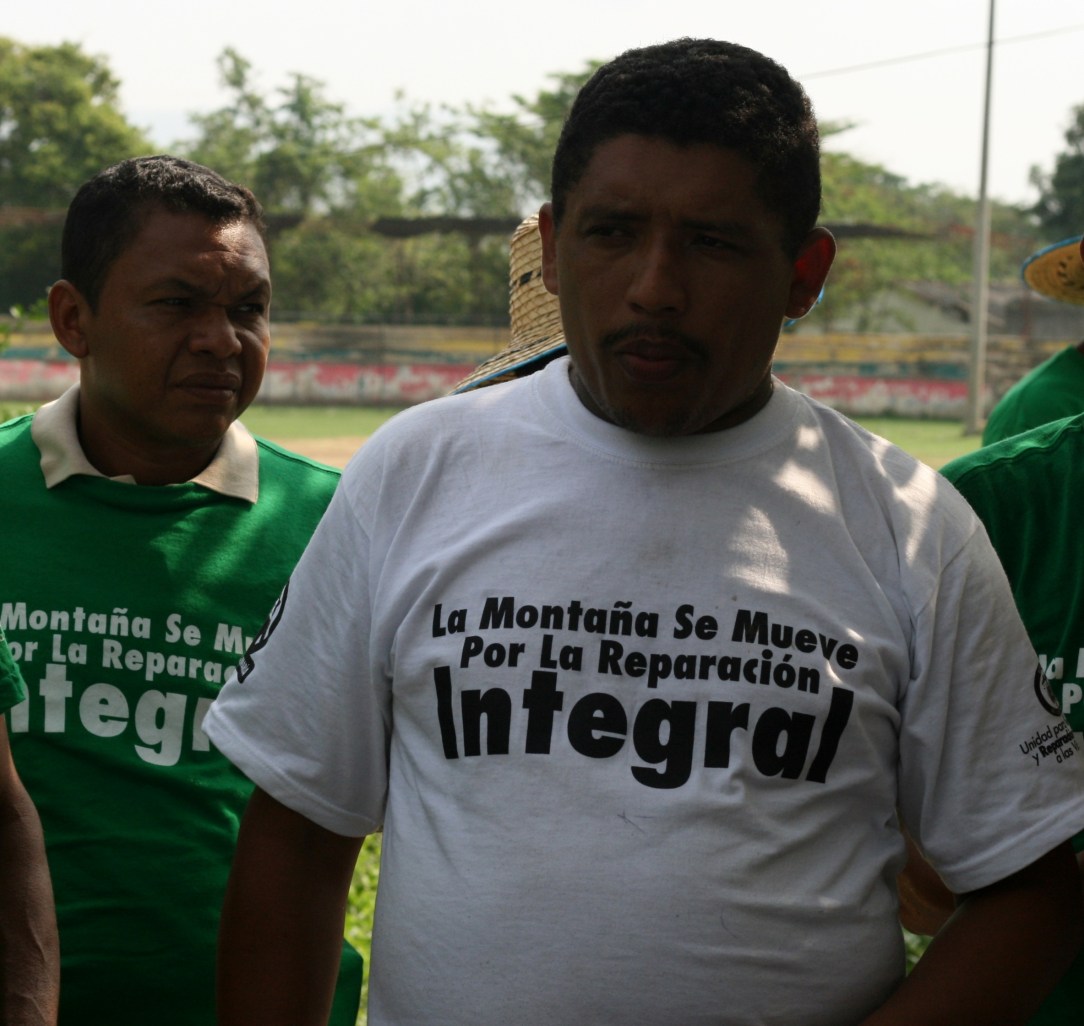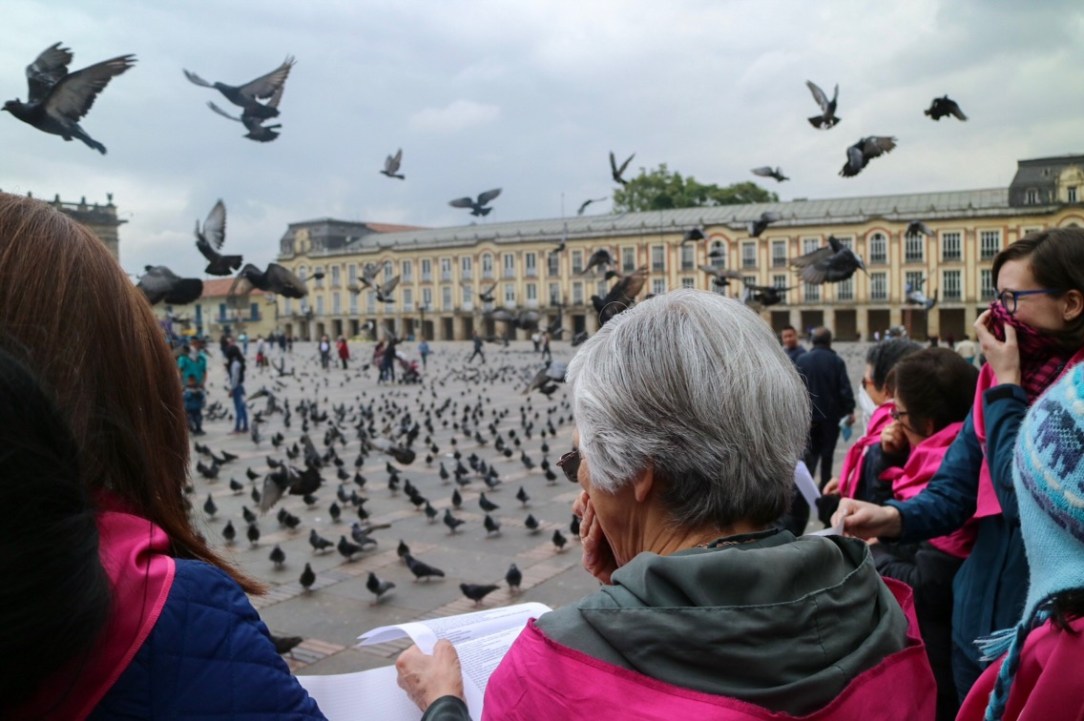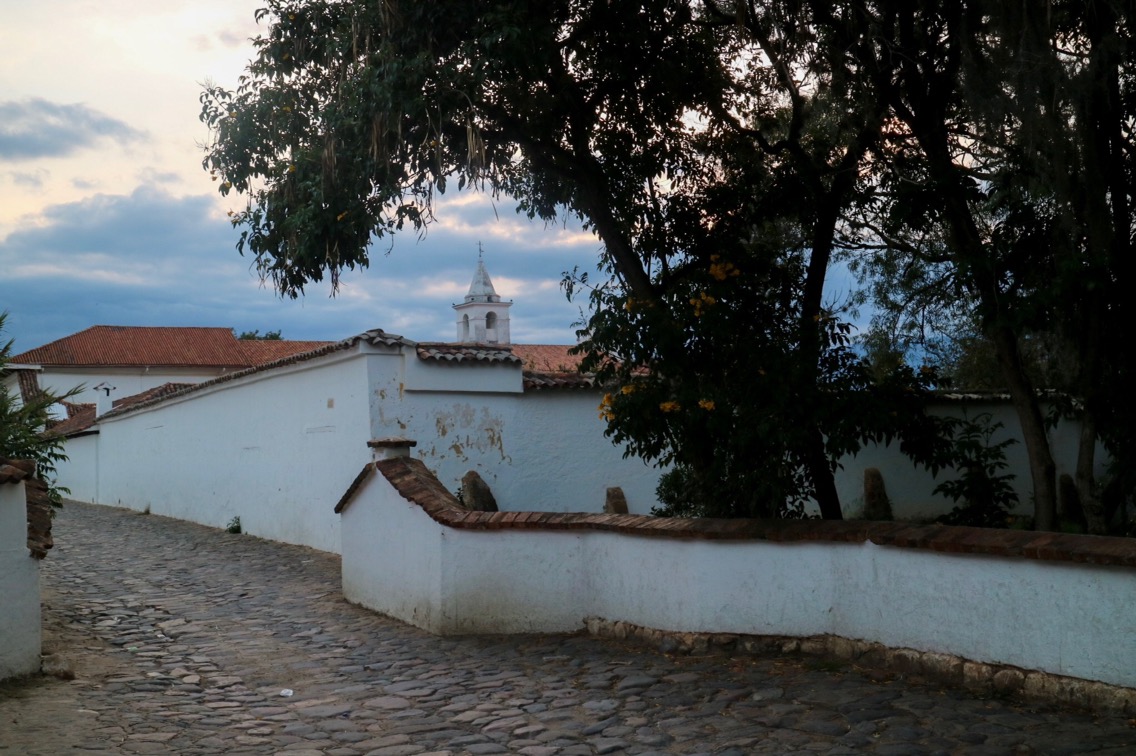Saturday was the 17th anniversary of Mampujan’s displacement and the massacre in Las Brisas. I sat in a coffee shop off the main square of Villa de Leyva and very slowly ate dessert, holding Mampujan to the light. Besides birthdays and Christmas, there are a whole new set of dates that now mark my life: Jorge’s arrest, displacement, death. Some events have taken place before I arrived, and the majority of the time, I am a peripheral player. An onlooker, not a victim. Living in proximity with those who hold a living memory of hechos and acts, however, has changed me, even if only in the way I understand the calendar. How does one live well in the midst of these dates, sitting in a coffee shop, overlooking a beautiful convent, cappuccino and cheesecake at hand?
 I finally got around to reading Louise Penny this month and have been wonderfully surprised. Some bits of these Quebec village based mysteries novels are a little cheesy, yet other sections are wonderfully profound. The main character, Inspector Gamache, is a man constantly surprised by murder. Despite the gruesome details of every case, he continues to believe in the goodness of humanity. Dealing with evil makes him more sensitive to the other side of life: the fragile beauty that is also present. Talking to a friend, in A Fatal Grace, Gamache expresses his philosophy:
I finally got around to reading Louise Penny this month and have been wonderfully surprised. Some bits of these Quebec village based mysteries novels are a little cheesy, yet other sections are wonderfully profound. The main character, Inspector Gamache, is a man constantly surprised by murder. Despite the gruesome details of every case, he continues to believe in the goodness of humanity. Dealing with evil makes him more sensitive to the other side of life: the fragile beauty that is also present. Talking to a friend, in A Fatal Grace, Gamache expresses his philosophy:
People expect me to be cynical because of my job,” Gamache found himself saying, “but they don’t understand. It’s exactly as you’ve said. I spend my days looking into the last room in the house, the one we keep barred and hidden even from ourselves. The one with all our monsters, fetid and rotting and waiting. My job is to find people who take lives. And to do that I have to find out why. And to do that I have to get into their heads and open that last door. But when I come out again,” he opened his arms in an expansive movement, “the world is suddenly more beautiful, more alive, more lovely than ever. When you see the worst you appreciate the best.
On Tuesday, a judge found Jorge Montes guilty on all charges against him and sentenced an innocent man to 39 years in prison. Lawyers and organizations are planning their response, but there is no timeline for his release. In the news later this week, I read that two other community leaders, Ciro Canoles and Harold Canoles, in the Montes de Maria have received death threats for this social justice work. Along with remembering Mampujan as I drink my coffee, I hold memories of laughing with Jorge as we travel up and down dirt trails, documenting roads and visiting families. I think about stopping at the end of the long day in Ciro’s store, not yet understanding the process of reconciliation and desire for justice that brought these powerful leaders together in one space, after years of mistrust, yet there I am, swapping jokes.
 On Wednesday, I found out that another community leader from the Montes de Maria, instead of being threatened, has been approved to travel to the US for a conference. She will talk about peace and trauma healing in Colombia. What is the difference? I am happy that she will have the chance to travel and share her powerful message, yet this freedom of movement makes Jorge’s imprisonment feel even more unbearable and unfair. What change can the post-peace accord era really hold, when community leaders continue to be equally threatened or exalted, depending on if their message is damaging to those in power or not?
On Wednesday, I found out that another community leader from the Montes de Maria, instead of being threatened, has been approved to travel to the US for a conference. She will talk about peace and trauma healing in Colombia. What is the difference? I am happy that she will have the chance to travel and share her powerful message, yet this freedom of movement makes Jorge’s imprisonment feel even more unbearable and unfair. What change can the post-peace accord era really hold, when community leaders continue to be equally threatened or exalted, depending on if their message is damaging to those in power or not?
Like Gamache, I want to be surprised by injustice. Not naive, but with a continual hope that justice and goodness are not only possible, but breathing in the air all around us. I will be realistic and analytical, questioning structures of power, and recognizing that justice is not about how I feel. I am a person with feelings, however. I want to leave space for my heart to ache over these questions and situations, to allow emotions to wash over me, to see sorrow and beauty in the same, long, glance, to believe in goodness.
 March 2 was in the anniversary of Berta Cacere’s murder. That night, we travelled to the north of the city, to the Honduran Embassy, to leave flowers in her honour and remind the authorities that justice has yet to be achieved in her case. March 8th was International Women’s Day, and I joined an ecumenical women’s group in the Plaza de Bolivar for the morning. We stood, small besides the Court, the Congress, the Mayor’s Office and the Church. Yet, as participant after participant read a poem, shared a song and reflected on the history of women’s day, not of chocolates and flowers, but of a search for justice in a place where 98% of the crimes of sexual violence remain in impunity, we filled the plaza.
March 2 was in the anniversary of Berta Cacere’s murder. That night, we travelled to the north of the city, to the Honduran Embassy, to leave flowers in her honour and remind the authorities that justice has yet to be achieved in her case. March 8th was International Women’s Day, and I joined an ecumenical women’s group in the Plaza de Bolivar for the morning. We stood, small besides the Court, the Congress, the Mayor’s Office and the Church. Yet, as participant after participant read a poem, shared a song and reflected on the history of women’s day, not of chocolates and flowers, but of a search for justice in a place where 98% of the crimes of sexual violence remain in impunity, we filled the plaza.
 There is much work to be done, across the Americas, including Canada, work that involves delving deep into the structural, messy depths of humanity. Watching the sunset over the white brick walls of an ancient town is a reminder that the world is, however, still beautiful, alive and lovely. Our flowers glowed besides Berta’s photo. At one point during the plaza gathering, a homeless, obviously intoxicated, man stumbled up to one of the nuns in our group, head bowed. She paused in her song, and placed both hands on his head and gave a moment of blessing. Over a seventeen year time period, a whole new generation of possibilities has been born in Mampujan, young people who cannot remember displacement, expect for stories.
There is much work to be done, across the Americas, including Canada, work that involves delving deep into the structural, messy depths of humanity. Watching the sunset over the white brick walls of an ancient town is a reminder that the world is, however, still beautiful, alive and lovely. Our flowers glowed besides Berta’s photo. At one point during the plaza gathering, a homeless, obviously intoxicated, man stumbled up to one of the nuns in our group, head bowed. She paused in her song, and placed both hands on his head and gave a moment of blessing. Over a seventeen year time period, a whole new generation of possibilities has been born in Mampujan, young people who cannot remember displacement, expect for stories.
 None of this means that Jorge will get out of jail or that we will achieve world peace. The events of this week and the reasons why we gather in plazas and in commemorations have filled me with sadness. I recognize my privilege is writing this reflection, in Villa de Leyva. I am not in the Sembrandopaz office, trying to figure out what went wrong and where things could have been done differently, not are I am in jail.
None of this means that Jorge will get out of jail or that we will achieve world peace. The events of this week and the reasons why we gather in plazas and in commemorations have filled me with sadness. I recognize my privilege is writing this reflection, in Villa de Leyva. I am not in the Sembrandopaz office, trying to figure out what went wrong and where things could have been done differently, not are I am in jail.
I still choose, however, to seek to magnify goodness and light, even when they shine brightness because of the contrast with everything that is wrong. Look for the yellow butterflies.
 I like to think Gamache would appreciate this poem:
I like to think Gamache would appreciate this poem:
A Brief for the Defense
Sorrow everywhere. Slaughter everywhere. If babies
are not starving someplace, they are starving
somewhere else. With flies in their nostrils.
But we enjoy our lives because that’s what God wants.
Otherwise the mornings before summer dawn would not
be made so fine. The Bengal tiger would not
be fashioned so miraculously well. The poor women
at the fountain are laughing together between
the suffering they have known and the awfulness
in their future, smiling and laughing while somebody
in the village is very sick. There is laughter
every day in the terrible streets of Calcutta,
and the women laugh in the cages of Bombay.
If we deny our happiness, resist our satisfaction,
we lessen the importance of their deprivation.
We must risk delight. We can do without pleasure,
but not delight. Not enjoyment. We must have
the stubbornness to accept our gladness in the ruthless
furnace of this world. To make injustice the only
measure of our attention is to praise the Devil.
If the locomotive of the Lord runs us down,
we should give thanks that the end had magnitude.
We must admit there will be music despite everything.
We stand at the prow again of a small ship
anchored late at night in the tiny port
looking over to the sleeping island: the waterfront
is three shuttered cafés and one naked light burning.
To hear the faint sound of oars in the silence as a rowboat
comes slowly out and then goes back is truly worth
all the years of sorrow that are to come.